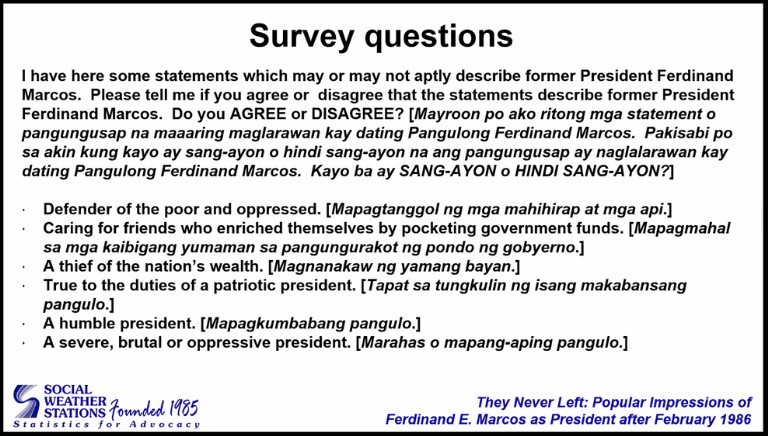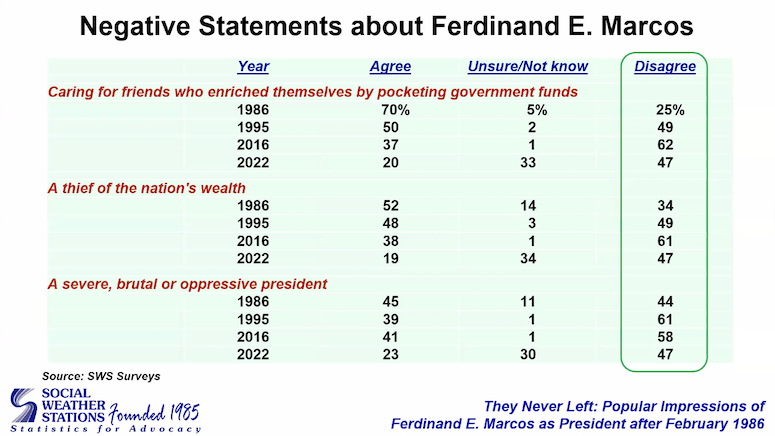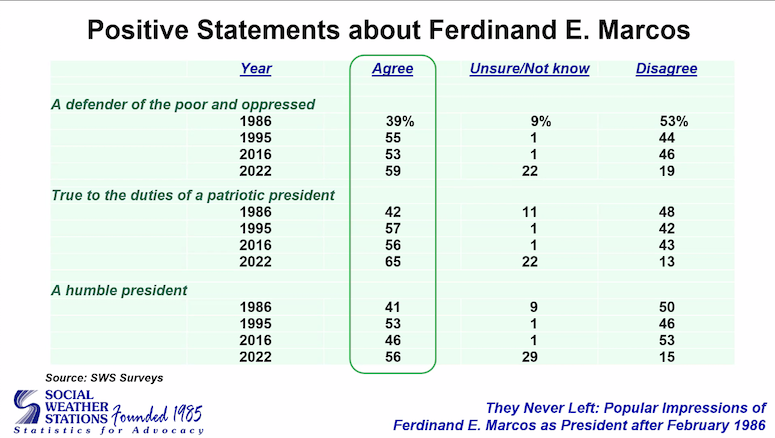SWS survey shows Marcos Sr. still favorably viewed by Pinoys as of 2022
Over three decades and a fourteen-year martial law later, the late former president Ferdinand Marcos Sr. remains favorably viewed by Pinoys, according to a survey by Social Weather Stations (SWS).
The study, which tackles the "popular impressions of Ferdinand E. Marcos as president after February 1986," was conducted by the social research institution among 1,500 respondents from January 26 to 29, 2022.
It comes 36 years after Marcos was ousted from Malacañang on Feb. 25, 1986 through the EDSA People Power Revolution which inaugurated then-vice president Cory Aquino as the country's 11th president.
Prior to this, Marcos ruled the country for two decades from December 1965. He was re-elected in December 1969 and continued to reign over the country via dictatorship, when he placed the entire Philippines under martial law on Sept. 23, 1972. Marcos abandoned his presidency and fled to Hawaii in exile with his family in the wake of the EDSA Revolution.
The results of SWS' 2022 survey were discussed during the organization's Sept. 27 forum at the SWS Knowledge Center in Quezon City and livestreamed via Zoom.
In the questionnaire, respondents were asked to determine if they agree or disagree with the statements describing Marcos. They were also given the option to state if they were unsure.

The results were presented by SWS in comparison to the results of the same survey conducted in 1996, 1995, and 2016.
According to the results of the 2022 survey, 47% of the respondents disagree that the late president is "caring for friends who enriches themselves by pocketing government funds," while a mere 20% agree that Marcos was in close ties with corrupt individuals. 33% were also unsure.
The number of people who disagreed had a huge increase from the 25% of respondents who had the same answer in the same survey back in 1986 and from the 70% who agreed at that time.
As to whether Marcos himself was "a thief of the nation's wealth," a little less than half of the 2022 respondents, or 47%, disagreed, while a lesser 19% agreed. The rest, or 34%, are unsure.
The number of respondents who disagree similarly increased from 1986 which, at that time, only resulted in 34% of the respondents. Those who agreed that Marocs was a "thief of the nation's wealth" three decades ago were almost half of the respondents or 52%.
While Marcos' dictatorship during the Philippine martial law from Sept. 23, 1972 to Jan. 17, 1986, is never forgotten by Filipinos for its record of human rights abuses, SWS' 2022 survey suggests that the former president is, in actuality, perceived by many as otherwise.
According to the results, 47% of the respondents do not see Marcos as a "severe, brutal, or oppressive president," while 23% do so and 30% are unsure.
The change in the society's views can be seen in the decline of the number of respondents who agreed that Marcos was an "oppressive president." It was at 45% back in 1986—the same year the martial law ended—and decreased to a mere 23% in 2022.

Apart from the negative statements about Marcos, SWS' survey included a number of positive perceptions about the late dictator, which many Filipinos proved to be in favor of in recent years.
Results show that in 2022, 59% of Filipinos agree that Marcos was a "defender of the poor and oppressed," which is a far cry from the 19% that think otherwise. 22% meanwhile admitted to being unsure.
The results proved that the Marcoses "never left" or never lost their power in the Philippines, as the number of people who agreed that he's the nation's hero remained high over the years, peaking in the year 2022.
It was at its lowest at 39% in 1986 and eventually increased to 55% in 1995. This number decreased by a mere 2% in 2016 but reached its highest at 59% last year.
Similarly, more than half of today's Filipinos look at Marcos as a leader who is "true to the duties of a patriotic president." This is seen in the 65% of respondents who agreed he is so, 13% who disagreed, and 22% who were unsure.
The number of respondents who viewed Marcos as an effectual head of state likewise increased, with the results growing from 42% in 1986 to 65% in 2022.
The same goes for those who think of Marcos as a "humble president," which resulted in 56% of the respondents last year. Only 15% disagreed and 29% said they were unsure.
2022's result had a significant increase from 1986's 41% that agreed and a huge decrease from the 50% that disagreed.

The late former president's son and the country's current chief of state, Ferdinand R. Marcos Jr., meanwhile had a slight decline in his latest approval ratings, which generally remained high since he took his oath of office in June 2022.
According to the survey conducted by Pulse Asia among 1,200 respondents last March, 78% approved of Marcos Jr.'s performance, down from 82% in November 2022. 80% meanwhile trusted the president, which is lower than the 83% he got last year.
The decrease was caused by the public's dissatisfaction with the president's handling of inflation, which is seen in the 52% of respondents who expressed disapproval of how the government has been addressing the national problem, 25% who said they approved, and 23% who were unsure.


